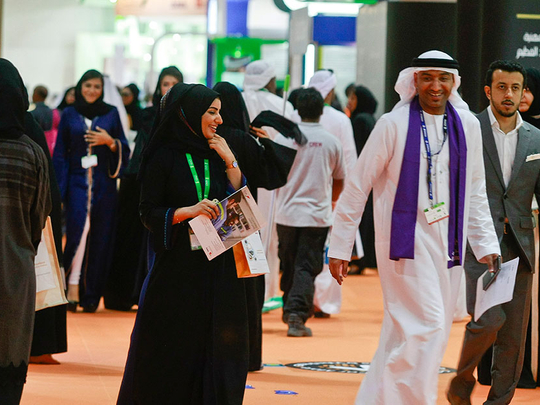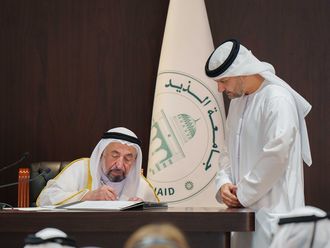
Dubai: Emirati youth, especially those looking to work in private or semi-private companies, should not compare their jobs with government jobs, said recruiters at Careers UAE 2015, who shared some of the challenges they face will trying to increase their Emiratisation rate.
Careers UAE 2015, one of the UAE’s leading recruitment, training and education exhibitions for Emiratis, was inaugurated on Tuesday by Shaikh Maktoum Bin Mohammad Bin Rashid Al Maktoum, Deputy Ruler of Dubai.
The three-day-event, which is taking place at the Dubai World Trade Centre until Thursday, has attracted over 160 private and public sector companies seeking to hire talented Emirati graduates and professionals.
At the fair, recruiters shared some of the challenges that they face while trying to recruit Emiratis and increase their companies’ Emiratisation intake.
Many of the challenges shared by recruiters revolved around Emirati youth expecting the job conditions, pay and flexibility of government jobs.
“Emirati youth should have a long-term vision. Emirates Group face a lot of competition, we have a strong brand but we lose many youth who decide to leave after seeing the requirements of the job. They are comparing their jobs to government jobs, which do not require as much work,” said Abdul Aziz Al Ali, Executive Vice-President of Human Resources at Emirates Group.
Al Ali said Emirati youth should take into consideration the long run, as Emirates Group provides the highest level of knowledge and experience that cannot be found anywhere else and provides an environment where its employees are trusted and respected.
“We are loonking for Emirati youth who have the right attitude, who are dedicated to work and want to go the extra mile,” he said.
Al Ali said Emirates Group is looking to hire Emirati high school graduates and university degree holders.
Zuhair Hameed Al Haj, Director of HR and Localisation at Al Futtaim, on the other hand, said the biggest challenge he faces in the Emiratisation process is pensions.
“There is a Dh5,000 pension cap for Emiratis working in the private sector, while in the government sector there is no cap and it can reach a much higher number. So Emiratis might think ‘this job is good now but in the future if I work in a government sector my retirement will be better secured,” he said.
Al Haj said there are talks with the responsible authority to close the pension gap between public and private companies.
Al Haj said there are currently 600 Emiratis working in the Group and they will be offering 200 more jobs every year for the next five years as part of their agreement with Absher.
“Last year we exceeded this Emiratisation target, we hired 230 and so got awarded by His Highness Shaikh Mohammad Bin Zayed Al Nahyan, Crown Prince of Abu Dhabi and Deputy Supreme Commander of the UAE Armed Forces,” said Al Haj.
Shaikha Sultan Al Merri, Director of the Human Resource Department at the Islamic Affairs and Charitable Activities Department, said she finds difficulty recruiting Emirati imams.
“We have established a programme to recruit Emirati imams in the UAE. There is a very small percentage of Emirati imams working in the country.”
Shaikha said few Emirati youth enter this field because it would require them to sleep in the mosque. So they prefer to opt for government or office jobs that they might consider more prestigious.
“We have 85 job vacancies in different fields today and our current percentage of Emiratisation is 73 per cent,” she added.
Khawatar Al Kazim, the HR executive at the Roads and Transport Authority, said the challenge she faces is graduates jumping from job to job.
“We would recruit them and start the training process and invest in them and then all of the sudden they leave. I advise them to have a goal, and not accept any job, because if they leave in the middle of the training process, they are taking someone else’s opportunity who really wanted the job,” said Khawatar.
Khawatar said the RTA has already met its target of Emiratisation and has an 83 per cent Emiratisation rate.
“Our percentage increase in Emiratisation this year is probably going to be up to 85 per cent only because we don’t want 100 per cent Emiratisation as we still want a mix so that our employees would benefit and experience working and communicating with different nationalities and [people from other] backgrounds, especially as the UAE is home to different nationalities,” she said.












